Please activate JavaScript in your browser to use all interface options.
Rosneft Develops Programme to Preserve Biodiversity in All Regions of Operation
21 October 2025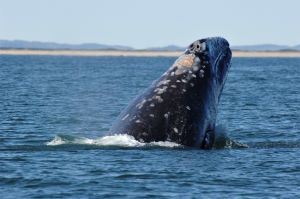
Rosneft’s environmental specialists have developed a standard corporate programme to preserve biodiversity in all regions of the Company’s operation. The document was developed on the basis of many years of experience in biodiversity preservation research and projects, as well as a wealth of scientific data gathered during numerous ecological expeditions.
The research work was carried out by experts from the Severtsov Institute of Ecology and Evolution of the Russian Academy of Sciences, Rosneft’s Arctic Scientific Centre and the Company’s scientific institute in Tyumen.
The programme is the result of extensive work that led to the creation of a comprehensive, prioritised list of significant species. These are biological indicators of marine and terrestrial mammals, birds, amphibians, reptiles, fish, terrestrial invertebrates, zooplankton, phytoplankton and terrestrial plants. The document provides a detailed description of each bioindicator species.
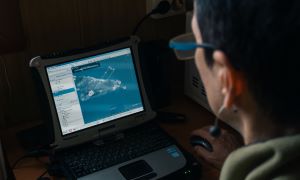 While working on the programme, the ecologists compiled a register of specially protected natural areas in Russia that correspond to the International Union for Conservation of Nature (IUCN) categories 1a (Strict Nature Reserve) and 1b (Wilderness Area). Such natural sites are ecologically important and are included in the UNESCO World Heritage List. Registries of the mandatory and additional measures implemented to preserve biological diversity in the regions of the Company’s operation between 2018 and 2022 were also created.
While working on the programme, the ecologists compiled a register of specially protected natural areas in Russia that correspond to the International Union for Conservation of Nature (IUCN) categories 1a (Strict Nature Reserve) and 1b (Wilderness Area). Such natural sites are ecologically important and are included in the UNESCO World Heritage List. Registries of the mandatory and additional measures implemented to preserve biological diversity in the regions of the Company’s operation between 2018 and 2022 were also created.
The programme incorporates the requirements and recommendations of Russian legislation on biodiversity preservation, as well as the provisions of the Kunming-Montreal Global Framework Programme, other international agreements and recommendations from international oil and gas producer industry associations.
The document also includes a standard template for a biodiversity programme for subsidiaries. It is planned to pilot test it in several enterprises. Following the results of the pilot project, there are plans to approve a unified standard programme for the Company to preserve biodiversity. This programme will take into account the specific characteristics of the region, the type of activity, and other criteria relating to the Company’s subsidiaries. This will make a significant contribution towards supporting national environmental protection projects.
One of Rosneft’s strategic environmental goals is to preserve and restore ecosystems and implement biodiversity preservation programmes.
Rosneft is implementing the most ambitious programme to study Arctic flora and fauna since the Soviet era. Over the past 13 years, more than 60 expeditions have been carried out, exploring all the Arctic seas, islands and coastlines. During the project, the scientists conducted a thorough study of the habitats, examining over 400 animals and tagging 140 of them with satellite transmitters. They also performed over 1,500 laboratory analyses of selected biological samples.
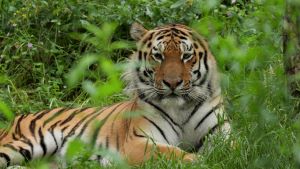 Rosneft supports the activities of the Amur Tiger Centre, an autonomous non-profit organisation that aims to increase the population of Amur tigers and protect their habitat. The Company’s funds are directed towards developing a comprehensive system for protecting the Amur tiger. This includes protecting the tiger outside specially protected natural areas and equipping operational hunting surveillance teams with modern technology and equipment to combat poaching. The system also aims to preserve food sources and reduce conflicts between tigers and humans. The project also involves monitoring the population status of the largest cat on Earth and conducting scientific research into it, as well as carrying out educational and awareness-raising activities. Thanks to collaborative efforts, the population of Amur tigers has grown to over 750 individuals, ensuring the preservation of this unique species.
Rosneft supports the activities of the Amur Tiger Centre, an autonomous non-profit organisation that aims to increase the population of Amur tigers and protect their habitat. The Company’s funds are directed towards developing a comprehensive system for protecting the Amur tiger. This includes protecting the tiger outside specially protected natural areas and equipping operational hunting surveillance teams with modern technology and equipment to combat poaching. The system also aims to preserve food sources and reduce conflicts between tigers and humans. The project also involves monitoring the population status of the largest cat on Earth and conducting scientific research into it, as well as carrying out educational and awareness-raising activities. Thanks to collaborative efforts, the population of Amur tigers has grown to over 750 individuals, ensuring the preservation of this unique species.
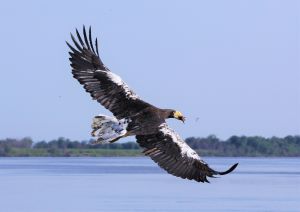 Rosneft subsidiaries are also implementing various environment-oriented projects to study key species of flora and fauna in the regions of the Company’s operation. As part of the Under Strong Wing project, eighty Steller’s sea eagle nesting sites have been discovered in the Far East. The project’s goal is to restore and preserve the population of this bird species. This data formed the basis for a set of measures developed to protect the largest birds in the Far East that are listed in the Red Book.
Rosneft subsidiaries are also implementing various environment-oriented projects to study key species of flora and fauna in the regions of the Company’s operation. As part of the Under Strong Wing project, eighty Steller’s sea eagle nesting sites have been discovered in the Far East. The project’s goal is to restore and preserve the population of this bird species. This data formed the basis for a set of measures developed to protect the largest birds in the Far East that are listed in the Red Book.
The Company supported the Central Siberian State Nature Reserve’s specialists in Evenkia as they studied the musk deer’s habitat. 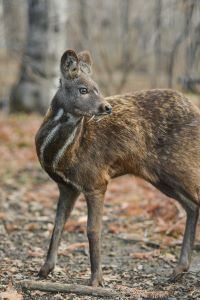 The scientists have discovered that there are 300 individuals of these cloven-hoofed animals in an area that was previously considered unsuitable for them. The results open up new possibilities for protecting the small population of Siberian musk deer from predators. Furthermore, the scientists are studying the possibility of setting up a farm to breed a species of animal listed in the Red Books of several Russian regions and on the IUCN Red List as endangered.
The scientists have discovered that there are 300 individuals of these cloven-hoofed animals in an area that was previously considered unsuitable for them. The results open up new possibilities for protecting the small population of Siberian musk deer from predators. Furthermore, the scientists are studying the possibility of setting up a farm to breed a species of animal listed in the Red Books of several Russian regions and on the IUCN Red List as endangered.
The Sakhalin Region has been implementing a programme to monitor the population of grey whales for 27 years. These marine mammals are a rare species listed in the Red Book and inhabit the northern part of the Pacific Ocean.
A series of environmental atlases presents the results of many years of scientific research. Rosneft has published several scientific works on the results of its activities, including the expeditions it has undertaken. 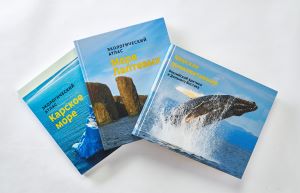 The Species – Bioindicators of the State of Arctic Marine Ecosystems atlas, published in 2020, provides information on over 60 indicator species.
The Species – Bioindicators of the State of Arctic Marine Ecosystems atlas, published in 2020, provides information on over 60 indicator species.
Between 2020 and 2023, the Company took part in various events as part of the national Ecology project. Over 320 million roubles were allocated to the project studying the state dynamics of key species, which are indicators of the sustainability of Arctic ecosystems, for the period 2019–2023.
At the 27th St. Petersburg International Economic Forum in 2024, Rosneft signed a new agreement with the Russian Ministry of Natural Resources and Environment on jointly implementing a number of measures under the Preservation of Biological Diversity and Development of Ecological Tourism federal project in 2024–2027, as part of the Ecological Well-being national project.
Department of Information and Advertising
Rosneft
October 21, 2025

-315xx70.png)

